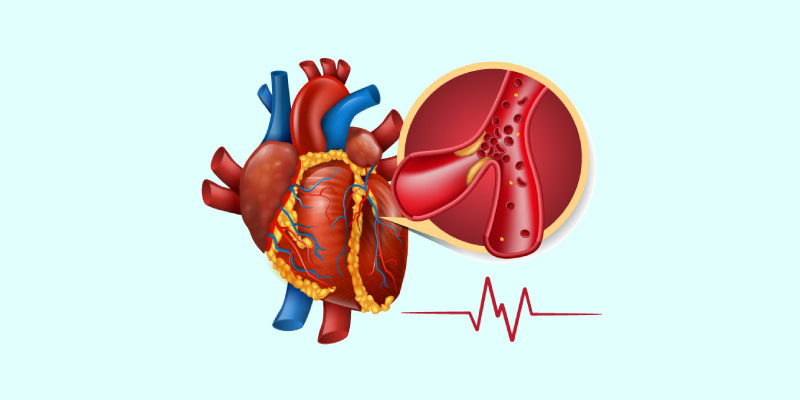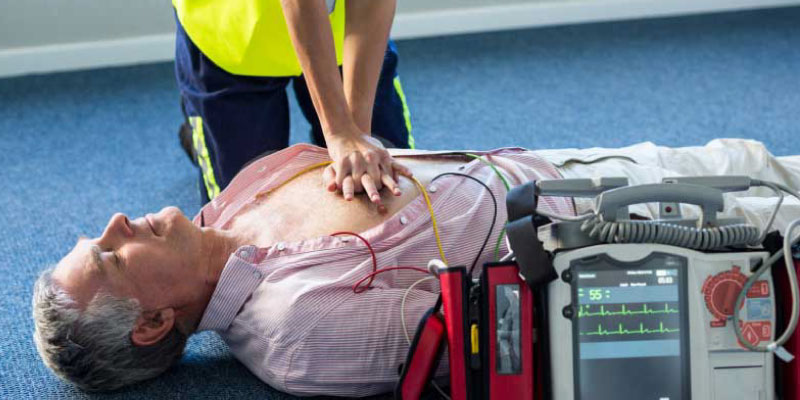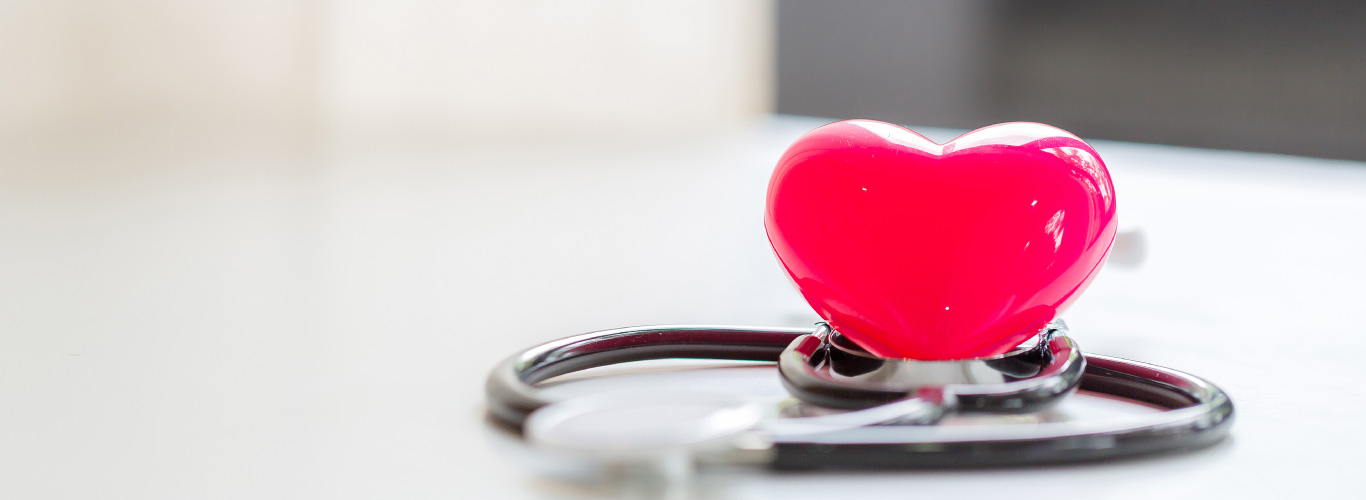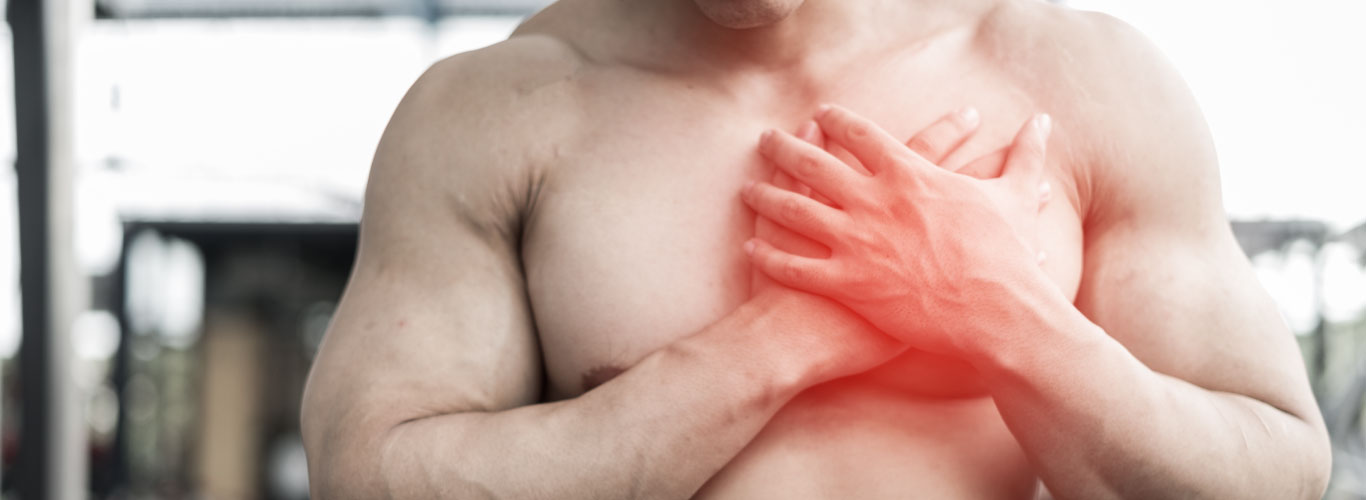Cardiac Arrest is an extremely serious heart condition where the heart abruptly stops functioning (pumping blood around the body). The heartbeat is controlled by electrical impulses. Sometimes the heartbeat becomes irregular due to a change in electrical impulse pattern. This condition is called arrhythmia and causes the heart to beat either too fast or slow. And, in Cardiac Arrest, the rhythm of the heart stops suddenly. This results in loss of heart function, consciousness, and breathing.
Some Facts about Cardiac Arrest:
- Cardiac refers to the heart and arrest means to stop; in Cardiac Arrest, the heart stops beating.
- Cardiac Arrest is also termed as Cardiac Death.
- Most people think that Cardiac Arrest and Heart Attack are the same thing because in both conditions the heart stops circulating the blood to the body. However, Cardiac Arrest is different from a heart attack. Cardiac Arrest occurs due to the electrical disturbance in the heart, but the Heart attack occurs when plaque blocks the flow of blood.
- Though heart attack and Cardiac Arrest are different from each other, sometimes heart attacks can trigger electrical disturbance leading to Cardiac Arrest.
- According to the report of the Center for Disease Control and Prevention, every year more than half a million people in the United States experience Cardiac Arrest.
- The condition may cause disability or death, but immediate treatments and professional help can save a life.
- In an emergency, using chest compression or cardiopulmonary resuscitation (CPR) can improve the chances of survival.
Causes of Cardiac Arrest

There are a number of factors that can cause Cardiac Arrest. However, the most common causes are:
Ventricular Fibrillation
The heart has four chambers and the lower two chambers are known as ventricles. Ventricular Fibrillation occurs when the ventricles shiver uncontrollably causing the disturbance in electrical impulses. The ventricles start pumping inefficiently and this results in lowering the flow rate of pumped blood. Sometimes, blood circulation stops completely and causes Cardiac Arrest.
Atrial Fibrillation
Another common cause of Cardiac Arrest is Atrial Fibrillation. In this condition, the sinoatrial (SA) node located in upper chambers (atria, or atrium) of the heart is not able to send electrical impulses appropriately. This condition disturbs the normal functioning of ventricles i.e., to pump the blood out to the body. The whole disturbance affects the electrical impulses and can stop the heartbeat abruptly.
Other causes include:
- Scarring of Heart Tissue: The heart scarring due to heart attack or other reasons. The scarring heart is prone to develop ventricular arrhythmias. This condition can cause sudden Cardiac Arrest.
- Cardiomyopathy: In this condition, the heart muscles get thickened or damaged due to heart valve disease or high blood. This condition can also trigger Cardiac Arrest.
- Electrical Abnormalities: Long QT syndrome, Wolf-Parkinson-White syndrome, and other such electrical abnormalities can also cause Cardiac Arrest.
- Blood Vessel Abnormalities: Some blood vessel abnormalities, particularly in the aorta and coronary arteries, can also cause Cardiac death.
Apart from these causes, there are some risk factors associated with Cardiac Arrest. These include:
- Coronary Heart Disease: The coronary arteries help blood flow from the body to the heart. When these arteries get blocked due to some reasons, the heart doesn’t get blood. This can cause the heart to stop functioning and lead to Cardiac Arrest.
- Heart Attack: People having a heart attack are also at risk of Cardiac Arrest.
- Large Heart: People having abnormally large hearts are more prone to experience Cardiac Arrest because the large heart doesn’t beat properly.
- Irregular Heart Valves: Any valve disease makes the heart weak, narrow, or leaky. This hinders the normal flow of blood resulting in weakened or enlarged chambers. This condition further increases the chances of Cardiac Arrest.
- Congenital Heart Disease: People born with heart damage are also prone to sudden Cardiac Arrest.
- Electrical Impulse Problem: Problem-related to the heart’s electrical system can also cause Cardiac Arrest.
Other risk factors include:
- Smoking
- High blood pressure
- Sedentary lifestyle
- Obesity
- History of a previous heart attack
- Family history of heart disease
- Male gender
- Men above the age of 45, or women over 55
- Low magnesium or potassium
- Substance abuse
Symptoms of Cardiac Arrest

Usually, Cardiac Arrest occurs without any warning signs or symptoms. This is why it is also termed as sudden Cardiac Arrest. However, there are some signs and symptoms of Cardiac Arrest before it occurs. These may include:
- Chest pain or discomfort
- Shortness of breath
- Heart palpitations
- Weakness
- Light-headedness or Dizziness
- Fatigue
- Vomiting or nausea
The patients who experience sudden Cardiac Arrest show symptoms including:
- No pulse
- Loss of breathing
- Loss of consciousness
- unresponsive
- Sudden collapse
Though these are some of the most common symptoms, it is seen that Cardiac arrest occurs without any sign or symptoms in most of the cases. It is important to check or call for an emergency in case of any hint of symptoms.
How to Diagnose Cardiac Arrest

If a person experiences sudden Cardiac Arrest, the doctor examines the heart to know the actual cause of Cardiac Arrest and prevent future episodes. For this he may recommend the following diagnosis test:
- Electrocardiogram (ECG): In this process, the electrodes (sensors) detect the electrical activity of the heart. These electrodes are attached to the chest and sometimes to the limbs. It is helpful in detecting heart rhythm disturbance, electrical patterns, etc.
- Blood Test: Just like any other condition, doctors perform blood tests for diagnosing cardiac rest also. For this, doctors take blood samples and check the level of magnesium, potassium, hormones, and other chemical substances. This is also helpful for knowing the reason behind the inability of the heart to function.
- Imaging Tests: Many imaging tests such as chest X-rays, Echocardiogram, MRI, nuclear scans, CT scans, and cardiac catheterization can be performed to diagnose Cardiac Arrest.
Conclusion
Cardiac Arrest is one of the most serious problems and should be treated as soon as a person experiences any symptoms. Consult doctors or medical professionals in case of any emergency.




